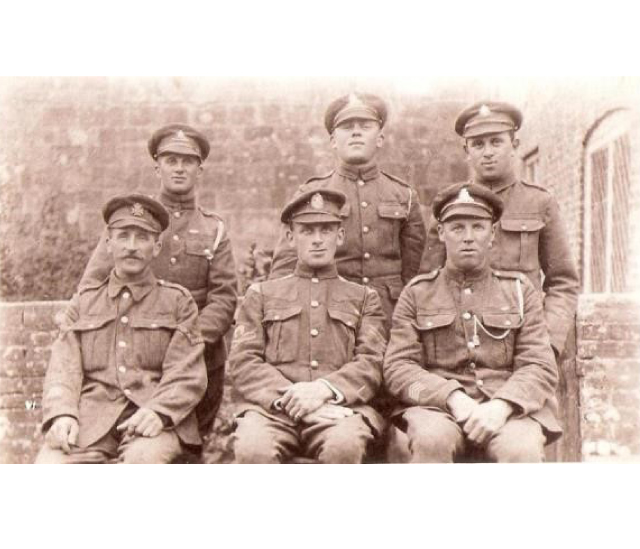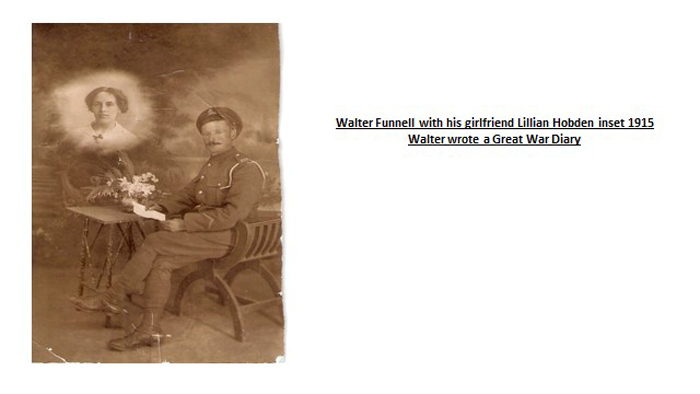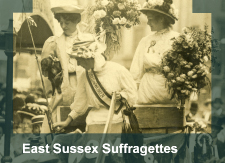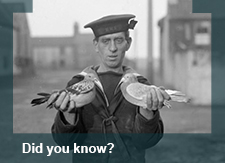This is an overview of the story of my maternal side of the family during the Great War, the 1st World War; the war to end all wars, if only that had been true.
Similar stories could be told by nearly everyone in the country, as every family was affected in some way, such was its terrible consequences and its legacy of further wars to come. The majority of the memoirs are from my Grandmother Grace Funnell (Nee` Hobden), with contributions from other members of the family.
My Great-grandparents John and Mary Hobden lived at Warbleton Priory, Rushlake Green near Heathfield; a rambling house with parts dating back to the 15th century, and one of the supposedly most haunted sites in Sussex, but that’s another story.
The family were farmers and horse breeders, Grace’s mother Mary also took in guests during the spring and summer months. In total I had eight Great uncles from Warbleton and my Grandfather Sydney Funnell serving in the army during the war; amazingly they all returned though, two of Gracie’s brothers William and Alfred died in 1925 as a consequence of the war due to gas poisoning.
The main photograph above was taken after the war depicts six of Grace’s brothers who served in the Great War; from top left we have David, Bert and Arthur. Bottom left William, Jabez and Alfred.
1914
To start the story we move back in time to June 1914 only a few weeks away from the outbreak of hostilities. On a beautiful warm sunny day on the Whit-Monday holiday the thought of war was a long way from everyone’s thoughts. Grace and other members of the family along with a whole host of others were enjoying the annual Athletic Sports day held on Rushlake Green. Grace’s father was one of the sports officials overseeing the various races and competitions. Grace was pleased to come in 3rd in the 100 yards handicap for girls under 12. Her elder brother Ebb came 2nd in the 100 yards for men and to everyone’s amusement 1st in the potato race.
The family looked back to this day with happiness and sadness, an innocent day of fun and laughter on a warm tranquil summer day, before the world went mad. It would prove to be one of the last gatherings of local people in peace time for four long years. Sadly a number of men mentioned in the Sussex Express news report for the day would appear on the Warbleton War Memorial.
The first recruitment advertisements appeared in the Sussex Express 6th August 1914 issue.
‘Your King & Country Need You’
‘Join the Army Today’
When war was declared after a sunny bank holiday on Tuesday 4th August, people didn’t know what to expect; after all there had been nothing like this crisis since the days of the Napoleonic wars 100 years earlier.
Suddenly everything changed and a great urgency of purpose pervaded everyone’s lives, the old slower way of doing things was about to be swept away. The first devastating affect for the family and young Grace came one August day in that year. Suddenly a truck appeared driving down the ¾ of a mile track-way to the Priory, creating a cloud of dust behind it. Grace was told later they were soldiers who had the authority to requisition the family’s horses.
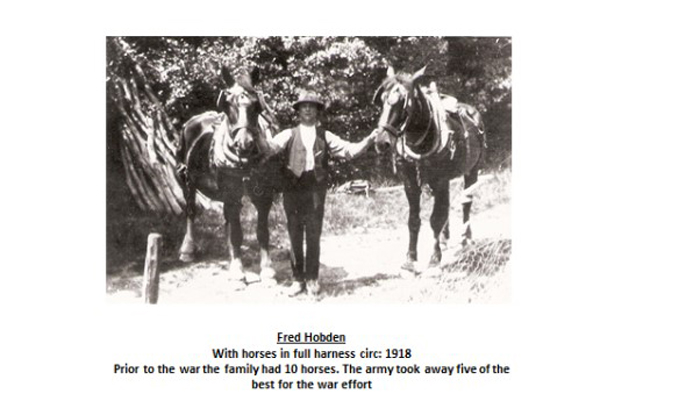 The Government had promised that only 50% of working horses would be taken from each farm in the country; in some cases the army took more than their quota. The family had ten horses at the time which included a couple of colts. The army took five away. Grace’s father John and her brother Fred the carter man of the family became upset with the officers and argued their case, saying the harvest had not been fully gathered, and the hop harvest was yet to start.
The Government had promised that only 50% of working horses would be taken from each farm in the country; in some cases the army took more than their quota. The family had ten horses at the time which included a couple of colts. The army took five away. Grace’s father John and her brother Fred the carter man of the family became upset with the officers and argued their case, saying the harvest had not been fully gathered, and the hop harvest was yet to start.
The purchasing officer said they could take them by force if necessary, but hoped it would not come to that, he reminded John that it was his and his family’s patriotic duty to release them. The army paid John for the horses but it was small compensation for trained horses. One of the Suffolk’s taken was ‘Jolly’, Fred’s favourite the lead horse on the wagon and plough. The other four Fred and John had raised from gangly legged colts. This was a dreadful time for the family to lose their beloved horses. Grace was broken hearted and could not be consoled and in distress pleaded with her father, tearfully saying ‘They will come back won’t they?’ what could he say. This was the first bitter taste for the family of the reality of war.
Requisitioned horses were usually first penned or corralled on fenced in village greens before being transferred to remount depots to begin their lives as army horses, war horses. Imagine the terror felt by these sensitive animals only use to the peace and quiet of country fields and meadows; to be suddenly transported across the channel, terrified of the sea crossing and then to be taken to their bases in France and Belgium and set to work near to the front lines pulling supply wagons through the mud of winter, facing the terrific din of shells exploding all around.
* * *
The pressure at home became intense to sign up as soon as possible; recruitment offices were set up in every city and town. Politicians toured the country giving emotional patriotic speeches, urging fit young men to sign up. Even our most famous local literary figure Rudyard Kipling expounded duty, patriotism and loyalty to King and country. Posters were pasted up on street corners with emotional headings such as ‘Women of Britain say go’; ‘Your country’s call’ with a picture of a village set in rolling hillside ‘isn’t this worth fighting for. ‘ENLIST NOW’! And, most famous of all Lord Kitchener pointing a finger straight at you with the words ‘Your Country Needs You’!
Lord Kitchener Secretary of State for War said Britain required a fighting force of 1 million men to combat the German force. The campaign was hugely successful at appealing to men of all ages, why miss this opportunity of a life -time it sounded exciting and anyway would soon be over.
Grace’s brothers David and Alfred were the first to enlist in the Royal Field Artillery on 10th August 1914. David was assigned to the Sussex Territorials eventually serving in India and later in the war to Mesopotamia (Modern day Iraq) fighting the Turks, the Germans allies. When Grace heard about her brothers enlisting she had a terrible premonition that something dreadful was going to befall her dear brother Alfred. On the day he was leaving the family bade him goodbye from the front of the house, she gave him a final tearful hug, Alfred said: ‘Farewell Gracie’, and then in an instant was gone. Grace in tears oblivious to everyone rushed up to her bedroom and threw herself onto her bed, where she remained for some time. This was the second bitter taste of war for Grace, the realisation that one may not see your loved ones again.
Early in the war with the wind in the right direction the heavy German howitzers (nicknamed ‘Big Bertha’s) firing on Flanders fields could sometimes be heard all day and night at the Priory; it was a constant reminder of what the poor soldiers were facing on a daily basis. More than anything Grace and Percy (Her youngest brother) said it could almost be felt like a dull thud, thud thud. Much to the annoyance of the family loose diamond panes of glass in the farmhouse windows were set rattling in their frames. Father went around pressing and squeezing the lead cams together which held the glass in place in a bid to stop the noise.
Occasionally the booms were so loud they sounded like the guns were being fired from only a few miles away. On the kitchen range if a saucepan lid was left on the side of the pan the vibrations were just enough to knock the lid off.
* * *
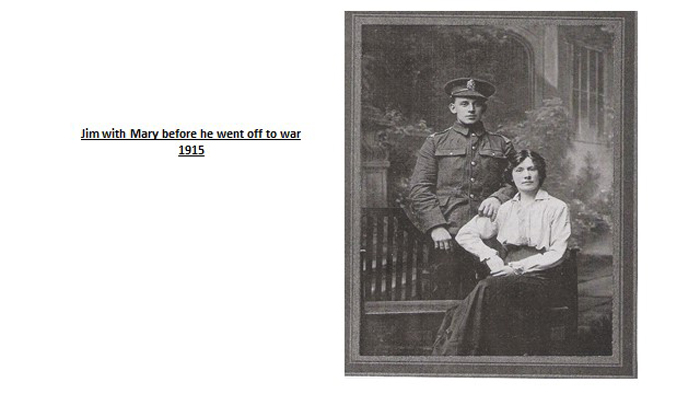 Grace’s elder sister Lillian had mixed emotions when her boyfriend Walter Funnell (Elder brother of my Grandfather) announced to her that he had enlisted into the R.F.A. in August. She was proud of him but worried about the future and what it could mean for both of them. Walter was to keep a war diary, extracts of which are included later on.
Grace’s elder sister Lillian had mixed emotions when her boyfriend Walter Funnell (Elder brother of my Grandfather) announced to her that he had enlisted into the R.F.A. in August. She was proud of him but worried about the future and what it could mean for both of them. Walter was to keep a war diary, extracts of which are included later on.
Bert, Grace’s second youngest brother became very frustrated and envied his elder brothers David and Alfred feeling he was missing out on this great adventure. On the 7th November 1914 he thought he would try his hand at enlisting even though he knew he was underage. One thing Bert did not lack was confidence and boldly marched into the recruitment office in Eastbourne. When he arrived and had joined the queue waiting to be seen he was surprised how everyone seemed so happy and were laughing and joking as if they were going on holiday.
When his turn came and he stood in front of the recruitment officer he felt a little nervous however, he need not have worried as the officer hardly looked up and just asked Bert his date of birth which he gave as 1896 which made him 18 years of age, when in fact he was born in 1899. The officer asked him to sign the enlistment paper and that was it he was in the R.F.A…
Bert was so afraid of what his father and particularly his mother would say that he gave his address as that of his eldest brother John Hobden (junior) who lived in Eastbourne. Prior to 1916 there was no legal requirement to produce evidence of age via a birth certificate. Eventually there was such an outcry over the number of ‘Boy soldiers’ joining up that in 1916 ‘proof of age’ had to be presented.
When father and mother eventually found out Grace said mother broke down crying out ‘You bring boys up and then what happens, they’re taken away to war to be wounded or killed’!
To the other extreme William, Grace’s second eldest brother at 37 years of age did not initially have to sign up so early. He was a married man with a family living at Ashburnham. Such was the pressure to enlist he decided to join the Royal Sussex Regiment in January 1915.
My Great-grandparents remaining sons John jnr, Ebb and Fred were in exempted occupations. John jnr was a dairy manager, Ebb had his own farm and Fred was carterman at the Priory a vital farm occupation.
On my Grandfather’s side of the family Walter Funnell as mentioned was the first to sign up. His elder brother Ernest followed in his father’s footsteps as a skilled wheelwright and would have been exempted however, he volunteered for the Royal Engineers on 12th December 1915. When it was realised he was a skilled wheelwright he was soon snapped up, a valuable occupation with so much horse and wagon transport in use.
* * *
Temporary tented army camps sprang up all over Sussex, initially the army could hardly cope with the huge numbers of recruits enlisting. The conditions for the men in the early days were dreadful; men froze in their tents during the early part of the winter of 1914. Men trained in their civilian clothes with broomsticks instead of rifles. Eventually the army got to grips and proper huts were constructed replacing the tents with uniforms and rifles provided.
Training could take several months of hard discipline, route marching and plenty of square bashing. Nothing though could prepare them for the true horror of their first duty which could last up to 2 weeks on the front line. Men in the trenches suffered such things as ‘trench-foot’, when due to their feet being in mud and water their feet swelled up inside their boots. Irritating lice that bred in the seams of their uniform were another contention that every soldier had to put up with.
More seriously for the first time in history mental illness brought on by intense battlefield conflict was being recognised; ‘Shell-shock’ was common, causing nightmares and uncontrollable shaking and tremors of the face, hands and legs.
Fortunately my Great uncles were in the main, drivers and escaped the horror of the trenches. The dangers they faced were enormous as very often they were carrying ammunition to the front line and just one stray bullet was between them and death.
* * *
One of Walter Funnell’s first diary entries reads 5th October 1914: ‘Lil (Lillian Hobden, Grace’s sister) sent me a lock of her hair’.
* * *
My Grandfather Sydney Funnell like so many from that era spoke little about his experiences. He too was a boy soldier falsifying his age and enlisting before the new regulations were imposed in 1916. He did mention about being out in the open at night in winter and sleeping close to the horses to get some warmth from them. On winter mornings he said it was quite normal to wake up and find you were stuck to the ground with frost.
I learnt later that he often cried himself to sleep at night praying he would be kept safe and that if his end did come it would be quick and painless. Sydney was a gunner firing 18 pound shells at enemy positions. When the Germans made their rapid final push in 1918 to crush the allies, Sydney said they were caught by surprise and had to make a rapid retreat firing their artillery guns with the horses hitched up to them. Strong bonds were formed between horses and men and they tried to look after their animals as best as they were able considering the conditions and the rationed food they were given.
Drivers were given the responsibility of looking after two horses each. Before being given control of their horses they were issued with a Blue Cross Guide book, titled ‘The Drivers, Gunners and Mounted Soldiers Handbook Management and Care of Horses and Harness’. An interesting note in the book explains ‘How to pamper a horse; when a horse is tired or cold pull his ears and rub his legs, it will refresh him and he will appreciate it’.
The food rations provided for men at the front were very basic and not conducive to a good constitution, consisting mainly of what was called ‘Bully-beef’ in tins and hard biscuits. This soon led to extremes of constipation or diarrhea. This is why the parcels from home that contained little luxuries were so looked forward to. The men often shared their contents with their mates. The parcels would also contain cigarettes (few realised the health implications then) and indeed raising money for ‘Tobacco funds’ for men at the front was common.
* * *
It soon became clear that the war would not be over by the Christmas of 1914, both sides had dug in for a protracted war. The trenches dug on both sides that so typified the Great War stretched all the way from Belgium in the North to the Swiss border in the South. As casualties mounted a divide developed between the men serving and loved ones at home. Grace’s brothers found relatives at home had little conceivable idea what it was really like at the front.
Correspondence and news reporting was heavily censored and sanitised and did not convey the true horror. It was tough at home but much worse for the men abroad and they found it difficult to explain what was really happening, and often did not want to anyway.
* * *
That first winter of 1914/15 was dreadful, men and horses faced terrible conditions; it was a struggle just to keep dry and warm.
Life At Home
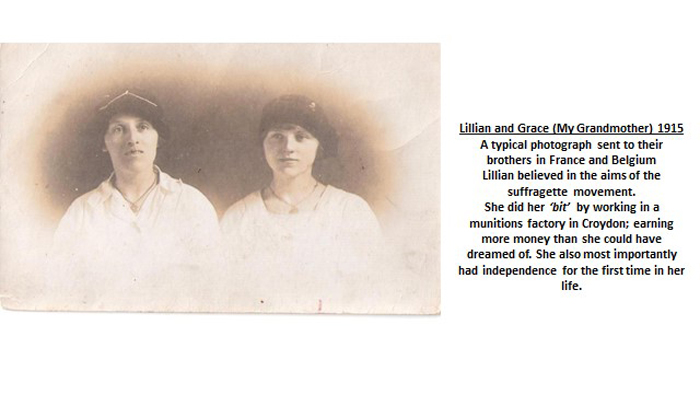 With the harvest barely in that late summer of 1914, the family struggled to get everything done in time before the bad weather began. Pressure was not only put on the family but the horses as well, everyone including families on neighbouring farms worked together, exchanging horses and farming equipment. Long days were expected during the harvest up before first light around 4 a.m. and finishing for ‘rack-up’ (Feeding the horses) at around 9 to 10 p.m., very little sleep led to tetchiness amongst family members, but all was forgiven at the end of the day.
With the harvest barely in that late summer of 1914, the family struggled to get everything done in time before the bad weather began. Pressure was not only put on the family but the horses as well, everyone including families on neighbouring farms worked together, exchanging horses and farming equipment. Long days were expected during the harvest up before first light around 4 a.m. and finishing for ‘rack-up’ (Feeding the horses) at around 9 to 10 p.m., very little sleep led to tetchiness amongst family members, but all was forgiven at the end of the day.
During the war the girls Grace and Lillian had to assist not only their mother with the guesthouse side of the business but also help out with the farming as well, hand milking the nine dairy cows and feeding the 21 heifers and steers, and pigs. Grace said her wrists ached terribly for the first week of milking until she adapted to it. The girls also had to get the water in for the household from the 30 foot deep well outside the scullery.
Father and Fred were eventually able to purchase other horses to replace those taken however, there was not much available as the best had been taken for the war. They went to the army barracks at Maresfield and purchased a nervous ex-army horse that had received three bullet wounds. With care and attention it proved to be a good all round working horse.
The family received a letter from David in November 1914 to say he was in India, the jewel of the Empire; based in Jullunda, Punjab. It was always a great joy Grace said when any of her brothers came home on leave, to know that they were safe and sound. One vital thing had to be done first before Mother allowed them into the house, they had to strip off their lice infested uniform in the outhouse and then have a hot bath. Their uniform was plunged into boiling water in the copper to rid it of lice.
Mother always made a special celebratory meal when any of her sons were home on leave.
The Christmas of 1914 was a rather subdued affair with so many of the family either busy with their own families or serving abroad in the army. They wondered what 1915 would bring.
A War Time Love Story
January 1915
January of the New Year proved to be very cold and everyone was concerned about their loved ones in France and Belgium. The Hobden family had a surprise letter from Grace’s brother Jabez (‘Jim’) to say that he would be coming home in the spring from Argentina.
The love story revolved around a long term relationship between Jim and Mary Morley who was a friend of Grace’s sister Lillian. Mary worked as a nanny for a wealthy Eastbourne family who had business interests in Argentina. In 1913 the Bonner family decided to move to prosperous Buenos Aires, Argentina, and expected Mary to go with them. She was undecided at first but had no real ties apart from her forming relationship with Jim. In the end she decided to go and there was a tearful separation between her and Jim.
To cut a long story short Jim followed her out there after a few weeks working his passage on a steam ship. When Jim arrived there he had to find work straight away to survive. He got a job as a horse trainer working as a cowboy or ‘Gaucho’ on the vast Argentine Pampas. He had to leave immediately and did not have the chance to meet up with Mary. What poor Jim failed to comprehend was the vast distances involved in such a large country. He was working hundreds of miles away from Buenos Aires and Mary. They were to never meet up all the short time they were both out there.
Then suddenly towards the end of 1914 the Bonner family’s business took a turn for the worse, Mr Bonner lost everything almost overnight. Unable to cope with this situation tragically Mr Bonner fatally shot himself. Mrs Bonner, her children and Mary had to leave Argentina quickly and get back to England. Mary just had time to send Jim a telegram explaining the situation.
Jim made up his mind to come back home and this time to settle their relationship once and for all.
He docked at Liverpool on 1st April 1915; he realised he would have to enlist straight away. He signed up for 2nd King Edwards Horse Regiment as a ’Trooper’. He eventually met up with Mary in London, proposed to her, she accepted and they married within days. However fate was to separate them again as duty called and Jim had to embark at Southampton on 14th July 1915, for Rouen, France.
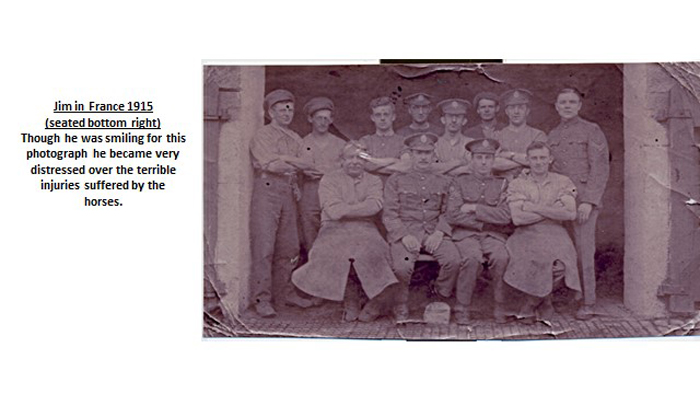 He was on duty in the field on 25th July. Jim looked after the horses and became very distressed and angered by the terrible injuries they suffered as a consequence of modern warfare. Jim and his colleagues saved many horses but far too many Jim had to put down with his pistol to save them from any more pain; this haunted him all his life. He felt the army made the horses carry far too heavy loads, leading to sores and lameness and their rations only provided 75% of their daily needs.
He was on duty in the field on 25th July. Jim looked after the horses and became very distressed and angered by the terrible injuries they suffered as a consequence of modern warfare. Jim and his colleagues saved many horses but far too many Jim had to put down with his pistol to save them from any more pain; this haunted him all his life. He felt the army made the horses carry far too heavy loads, leading to sores and lameness and their rations only provided 75% of their daily needs.
Relief from this imposed torture came for Jim in the most bizarre fashion, when on the 13th August 1915 his division came under heavy enemy shelling. It was expected the Germans were about to make a sudden advance; the men were ordered to prepare for this. In the ensuing rush as the men grabbed their rifles one of Jim’s comrades accidently fired his rifle. The next thing Jim felt a stabbing pain at the back of his shoulder and he fell to the ground in agony. He was taken to a field hospital and then to a hospital in Etaples. He was there for some time recuperating from his wound. Jim still complained of pain in his shoulder and it was later discovered he had shrapnel left in his shoulder.
On the 31st August he was transferred briefly back to England before travelling to Kilkenny, Ireland for an operation in 1916 and recuperation. Jim’s war was over but worse of all he was again separated from Mary and would remain so until 1918. Jim’s war was over but worse of all he was again separated from Mary and would remain so until 1918
Zeppelins
1915 brought a new warfare menace for the first time in history terror from the skies. On the 1st February the Kaiser authorised Zeppelin raids on London. These huge 700 feet long silver cigar shaped balloons brought panic and terror to the civilian population. Zeppelins could fly at such a height that the Royal Flying Core biplanes had difficulty in reaching them. The Germans abandoned using them towards the end of the war in preference to ‘Gotha’ biplanes, after losing eleven on a bombing raid on the Midlands in 1917.
Zeppelin in the sky
On the 25th September 1916 Father, Grace and Percy were travelling home after visiting relations in Waldron. As they passed through Cross-in-Hand on what had been a glorious still day they saw to their astonishment ahead of them in the eastern sky an airship. Father pulled the trap over and they just gazed at it listening to the lumbering growl of its engines. Then to their horror as it turned slightly the black cross of Germany on its side came into view. At first they did not know what to do, excited and terrified at the same time whether to dive for cover or just stand and look.
In the end they did the latter as they realised it was not interested in them and was too far away anyway. The Zeppelin they saw may well have been the L31 which flew over Tunbridge Wells on its way to London.
Walter Funnell’s Diary
18th December 1915
‘I received my Christmas parcels from Warbleton’.
19th December 1915
‘There was a bombardment opened out at ½ pass 2 in the morning at Ypres, and it stopped at ½ pass 8 in the morning’.
* * *
Looping-the-loop
Just prior to the war those magnificent men in their flying machines looped-the-loop in their new-fangled biplanes performing all sorts of exciting acrobatic tricks, thrilling onlookers. Grace said her father was not very happy when they occasionally flew low over the Priory as they scared the horses and cattle.
One September day in 1915 during hop picking time when Bert was home on leave and lending a hand with picking,when suddenly out of the blue a biplane buzzed the roof of the Priory flying low over the trees and fields, scattering the horses and cattle in terror. Fred had to hold onto the horses pulling the wagon used for off-loading the hops, he was not very impressed. Then to the onlookers amazement he flew around and landed in a field close by to Grovely Farm.
The pilot apparently had a girlfriend at Grovely and as he over-flew the area he decided literally to drop-in to see her for a while.
His biplane caused major excitement in the area, many people saw him circling and landing as hop picking was taking place on most of the farms in the vicinity. Even children at Rushlake Green School were allowed out early to see it. There developed such a crowd that the airman became concerned for the safety of his aeroplane and the explanation he would have to give if it was damaged. He asked the crowd if there were any serving men on leave, Bert said he was and the airman asked him if he would stand guard for a while. Bert obliged and felt very important, keeping people at a distance from the biplane.
The young ladies present thought the airman was very dashing and handsome, the men on the other hand were highly jealous.
Walter Funnell’s Diary
26th January 1916
‘On the 26 of Jan Bdr Whitehead had two fingers and a thumb blown off with a rifle grenade, playing with it. He was sent to hospital same day’.
5th February 1916
‘There was a nine team turned out to go to Wendem (Ubendem?) for forage. We got back at 8 o’clock at night. And we sent eight teams to go and help the 79, 80 and 81 Brigade move up into action’.
8th February 1916
‘The O.C. came around at 11 o’clock and he went up in the loft and caught 7 men playing cards, and he made them all prisoners’.
20th February 1916
‘We went to the R.E. Dump for some timber to build up a road, and there was 27 German aeroplanes up and they were dropping bombs on Poperinge and close to our stables’.
21st February 1916
‘There was a German up and he tried to drop bombs on our aeroplanes in sheds, but he missed by one field’.
* * *
Spring Snow Storm
In March 1916 there was a fierce blizzard blew for several hours causing the Priory to be shrouded in a ghostly halo of white. The track-ways and roads were blocked with huge snowdrifts. The family was cut off and isolated for several days; the situation though was not desperate as they were self -sufficient. The hardest job was feeding and insuring the animals were safe.
* * *
The Battle of The Somme started on July 1st 1916 with dreadful losses resulting in 57,470 casualties, 19,240 dead.
* * *
Walter Funnell’s Diary
2nd July 1916
‘We shifted our columns about 3 miles forwards and we stopped there until the 5th July, and then we moved to Meaulte and our chaps took 11,000 prisoners in 2 days’.
20th July 1916
‘We lost Le Mitry wood in the morning and the Gordon Highlanders took it back again the following morning, with heavy losses’.
27th July 1916
‘We all had to parade without any clothes on and go down to the river to bathe and walk to Truex’.
28th August 1916
‘I had the first letter from my brother (Sydney) when he landed in France. He wrote it on the 15th August and I got it on the 28th August’.
* * *
Walter and Sydney unexpectedly met up near the front line. One day Sydney was watching a passing convoy of GS wagons when he suddenly heard “Hello Ginger” shouted from one of the wagons, it was Walter, he obviously could not stop but it was a nice surprise.
* * *
18th September 1916
‘Sergt, Major Lowe was tried for being drunk and incapable while in charge of 16 teams of ammunition, and was tried by Capt, Grownschille of 78 Brigade; and he got a general court martial.
6th December 1916
‘There was several German aeroplanes came over about 1 0’clock in the morning and were dropping bombs around us and sweeping the ground with their machine guns’.
* * *
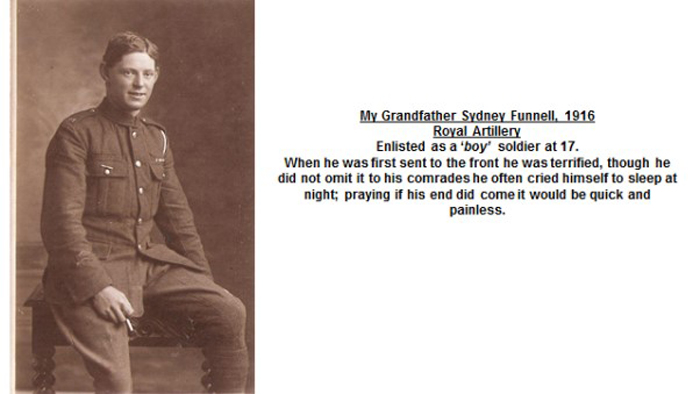 David Hobden wounded by tribesman
David Hobden wounded by tribesman
In early June the family received a letter from David that at first gave them great cause for concern. He was writing from his hospital bed after being shot in the arm.
Apparently he had been on horse patrol in what is now Pakistan, high up in the mountains when his troop came under fire from native tribesmen. Unfortunately for David they shot him in the arm fracturing a bone.
After being shot, David lay on the ground whilst his wound was attended to, it was then he spotted the lead shot that had passed through his arm nearby on the ground, he placed it into a matchbox to keep it as a souvenir.
He was in hospital for 28 days.
Munitions work for women
The role of women in the Great War was to prove the turning point for them eventually gaining equal voting rights with men.
With so many men away at war it was realised that women could play a vital role in taking over many of the jobs in industry and services; though it was expected men would regain their former positions at wars end.
The suffragettes threw their weight behind the new opportunities that suddenly opened up for them and fully supported the roles for women. Lillian Hobden (Grace’s elder sister) was aged 31 in 1916 agreed with many of the aims of the women’s movement. She felt she had a duty to make a contribution to the war effort.
Lillian went to work in a munitions factory in Croydon, finding lodgings not far from the factory. This was quite an adventure for her and all the women that took up work for the first time.
The hours were from 8 a.m. to 6.30 p.m., two solid weeks on then two off when she often returned home. The work was very monotonous but required extreme concentration as any accident could prove fatal. The money was good; shell filler’s could earn 5 shillings a week. For the first time women had a form of financial independence.
Sussex Express
April 13th 1918
Land Women
‘They feed the lambs and pigs and calves they feed and milk the cows.
They drive the motor tractors and they walk behind the plough.
They clean out all the stables and the sties and yards-for now’s the time to win the war.
Of course it makes them tired, but it keeps them jolly fit!
And they think of all the boys in France their patience and their grit.
And they say ‘God helping them and us we all will do our bit’
* * *
Timber!
Early in the war lumberjacks employed by the Government came into the area to requisition timber for the war effort. They had the rights it seemed to cut down anything they saw fit for purpose. Most timber cut was used for pit props and other supporting purposes. Grace and Percy said they cut down whole avenues of beautiful trees and made a terrible mess in the process. The track-ways around the Priory were turned into impassable quagmires during the winter.
Little thought was given to the effect on landscapes; there were bare hillsides with stumps of trees sticking out of the wounded earth, portraying a scene of devastation in many areas around the County.
* * *
Young Percy tries to enlist
Percy, Gracie’s youngest brother was so desperate to follow his older brothers, in 1916 at the age of 14 he ran away from home and made his way to Woolwich barracks in an attempt to enlist.
Fortunately, but unfortunately for him in a million to one chance one of his brothers just happened to be there on the day, and pointed out to the recruitment officer that the lad in front of him was in fact his brother and underage.
Frustrated Percy was sent home with a flea in his ear.
1917
Walter Funnell’s Diary
4th February 1917
‘A German aircraft No 1 came over our camp at ½ pass 11 on Tuesday night and dropped bombs and killed 21 horses and Mules’.
8th February 1917
‘They dropped bombs on a big shed at Carnoy where re-enforcements stayed at the station for the night. It killed and wounded several’.
15th February 1917
‘They came over at 5 O’clock in the morning and dropped bombs on an ammunition dump and set it on fire, and it burnt for 36 hours’.
* * *
On 6th April 1917 America declared war on Germany. Their declaration would force the Germans into a dramatic last gasp of desperate action to win the war before the American forces were up to full strength.
* * *
Walter Funnell’s Diary
10th May 1917
‘Gnr (Gunner) Day and Burchall met with an accident by a German or French morter shell. Cpl (Corporal) Jackson was making a souvenir with it and it went off and blew off his right hand, wounding the others’.
* * *
1917 proved to be a sad year for Warbleton, with many local men either killed or injured. Grace’s brothers William and Alfred suffered gas poisoning and poor Alfred also contracted T.B. (Consumption).
* * *
1918
On January 17th 1918 Mary Hobden sent a letter to the war office expressing concern over her son David, as the family had not heard from him since October 1917. She asked for any information as to his whereabouts.
In a letter he had forwarded in October 1917 from India he had stated he was expecting to go soon on active service and that he would send his belongings back home to the Priory, but nothing had been heard from him since. At the time he was based in Ferozepore, India.
The reason why the family had not heard anything became clear when the war office explained David had embarked at Bombay on 11th October 1917 for Basra, Mesopotamia, joining up with the 17th Indian Division.
The object of the Mesopotamian campaign was to push the Turks out and gain control over the important oilfields.
Though David was involved in the latter stages of the campaigns against the Ottoman Turks he and his comrades faced appalling conditions. The British army had 27,000 casualties, with 13,000 dead.
On the 30th October 1918 the Armistice of Mudros was signed. The war in Mesopotamia was over on 14th November 1918.
* * *
The sixth and final son to enlist was Arthur. He was a peaceful man and hated the thought of war and fighting.
Arthur waited until the last possible moment before his conscription papers arrived in 1917. He enlisted into the Royal Sussex Regiment and fortunately was assigned to look after cavalry horses which suited him well. He too was greatly upset and affected by what the horses had to put up with.
Sussex Express
September 6th 1918
‘Patriotic Warbleton family Mr& Mrs John Hobden of Priory Farm Warbleton now have six sons serving in the army’.
Walter Funnell’s Diary
21st March 1918
‘On the 21st March the Germans made their advance he started at ½ pass two in the morning, and we had 24 different camps in 10 days and now we are at Contay’.
The above was Walter’s last diary entry; this may have been because of the huge pressure the army was put under when the Germans made their massive push to win the war before the Americans were up to full strength. As the entry indicates Walter was constantly on the move as the allies were pushed back. On April 11th 1918, General Haig gave his famous ‘Backs to the wall’ order as the Germans made their advance. There were huge losses on both sides; in the end the Germans overstretched themselves and were unable to retain the ground they had gained.
The Sussex Express reported on ‘Scenes from the greatest of battles, hard fighting by Sussex men’.
Sussex Express
May 13th 1918
‘The Great Battle’
‘Warbleton gunner falls in German push’.
‘Mrs Hedgecock of Turners Green, Three-cups, Warbleton whose husband at the age of 35 years was killed in action on April 4th has received the appended letter from an officer- ‘He was struck by a shell splinter whilst assisting to work the guns under heavy fire. I was close to him at the time, and can assure you that he did not suffer in any way, as he was unconscious from the instant he was hit until his death some hours later. He was not disfigured in any way. It may be some consolation to you to know that he and his comrades played a very big part in defeating the great enemy thrust at Amiens about which you have no doubt read by this time. Four German divisions attacking in a narrow front were turned back with heavy losses by our artillery fire’.
* * *
July 15th saw the last German offensive in the West.
Facing imminent social collapse at home and mutiny of parts of the navy, the Kaiser realised it was time to sue for peace. The end was in sight.
In the Sussex Express November 1st issue 1918 there were the first reports of influenza deaths increasing.
‘Death from influenza at Heathfield – Miss Florence Kate Leeves, fifteen’-
‘Influenza Victims’
‘Three deaths at Uckfield’.
‘Influenza at Hailsham and Heathfield’.
‘There are between 60 and 70 cases of the influenza at Hailsham and the schools are closed’.
‘At Heathfield all the schools are closed and social events are being postponed’.
Sussex Express
15th November 1918
‘A Victorious Peace Rejoicing in East Sussex’
‘Throughout the whole of East Sussex every community large and small awaited eagerly the expected news of the peace Armistice. When tidings came on Monday the feeling uppermost in all hearts was one of thankfulness and gratitude. Four terrible years of killing were at an end, and now the cause for which so many gallant men from the Sussex villages have given their lives, had triumphed and the sword was at last sheathed’
* * *
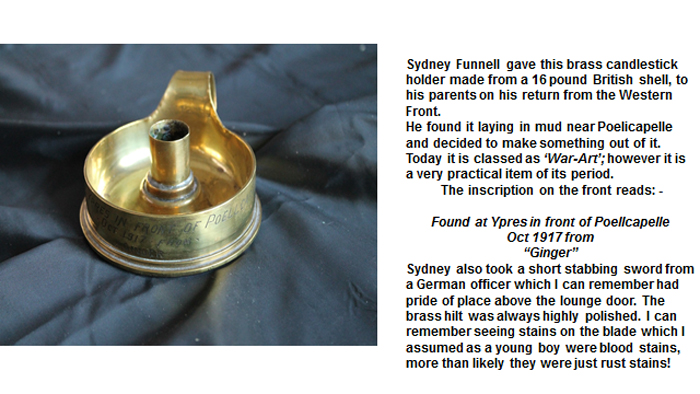 Grace quite expected all her brothers would return home straight away, but it was several months before she finely gladly saw them again. There was much rejoicing and John and Mary had a special meal prepared for each son as they returned. With a grand get together of the family when all the sons were safely back home.
Grace quite expected all her brothers would return home straight away, but it was several months before she finely gladly saw them again. There was much rejoicing and John and Mary had a special meal prepared for each son as they returned. With a grand get together of the family when all the sons were safely back home.
Peace Celebrations
It was decided to hold peace celebrations for Warbleton Parish on Saturday 19th July 1919. They began the day early with a cricket match on the village green between the village club and service and ex-servicemen. Fittingly the servicemen won by 14 runs. At 1 o’clock 60 service and ex-servicemen sat down to a meal in the back garden of the Horse & Groom. There were two trestle tables loaded with food and drink. The hosts Dr. Burfield and the Rector sat at the head of the tables.
Among those who served the men was Mrs Burfield in a beautifully trimmed hat, and her daughter Mary, dressed all in white. In case anyone was overcome by the splendours of the occasion, Mrs Oilver from Turner’s House and a Red Cross nurse were in attendance. In the afternoon the whole village joined in with sports for adults and children and at the end of the day about 500 people sat down to a meat tea.
Sussex Express
May 14th 1920
‘Warbleton’s Fallen – Brass Tablet Dedicated’
‘Warbleton Parish Church was crowded to overflowing on Sunday afternoon when the large brass tablet bearing the names of thirty local men who fell in the war was unveiled by Mrs W. Pope (a mother of three sons who fell, out of six who served) and dedicated by the Archdeacon of Hastings. The tablet, which is placed on the north wall of the chancel, is inscribed’: – “To the glory of God and to the sacred memory of those connected with this parish who sacrificed their lives for King and Country in the Great War 1914-1918”.
Edward Beal, private, Royal Sussex Regiment.
Frank Bonnett, private, Royal Sussex Regiment.
Walter Bourner, private, Royal Sussex Regiment.
Clifford Brook, private, Royal Sussex Regiment.
Cyril Buss, private, Royal Sussex Regiment.
Alfred Cornwall, private, Royal Sussex Regiment.
George Cornwall, private, Royal Sussex Regiment.
Anthony Dorman, M.C., Chaplain, East Yorks Regiment.
Decimus Dorman, private, Royal Fusiliers.
John Fox, private, Royal Sussex Regiment.
Frederick Funnell, private East Yorks Regiment.
John Graham, Captain, Lincoln Regiment.
Albert Hall, private, Royal Fussiliers.
Henry Harmer, private, East Kent Regiment.
James Hedgecock, gunner Royal Field Artillary.
John Henty, private, Royal Sussex Regiment.
Harry Hobday, private,Royal Sussex Regiment.
Frederic Hughes, 2 Lieu, York and Lancs Regiment.
Edgar Message, private, Royal Sussex Regiment.
Herbert Newnham, private, Royal Sussex Regiment.
Frank Oliver, private, A.S.C. M.T.
Albert Pope, gunner, Royal Field Artillery.
Harry Pope, private, Royal Sussex Regiment.
Wilfred Pope, private, Royal Fusiliers.
George Robins, lance corp, Trench Mortar Battery.
Thomas Rose, Q.M.S., 1st Royal Sussex Regiment.
Sydney Slidel, 2nd Lieut, Lincoln Regiment.
James Smith, private, Royal Sussex Regiment.
Matthew Smith, private, Royal Sussex Regiment.
Hubert Winchester, private, Royal Sussex Regiment.
“Their name liveth for ever more”
* * *
The consequences and challenges of ‘The Great War’ would last for many years and eventually lead to yet another disaster in 1939.
So many families were affected by the loss of loved ones; a generation had been swept away in a few short years. Too many women had to cope and get by without the wage earner being around. The Hobden and Funnell men had all fortunately returned home. Tragedy was delayed a few more years until both William and Alfred Hobden sadly died within a few weeks of each other in 1925 due to the war.
Acknowledgements
With grateful thanks to my relations for their patience and endurance under heavy and prolonged interrogation.
And to the following: –
East Sussex Records Office
Census returns for 1901, 1911 and 1921
Kelly’s Directory 1910-1920
Sussex Express& County Herald
Warbleton & District History Group
www.ancestry.co.uk
This story was submitted by Stephen Ziegler

